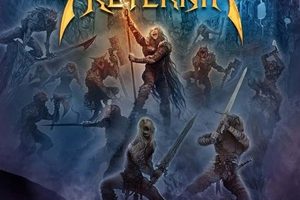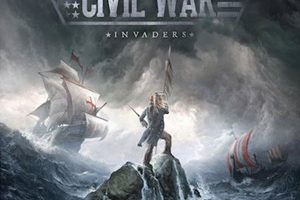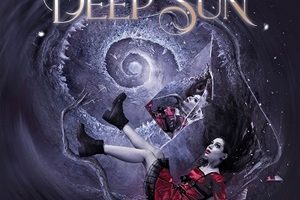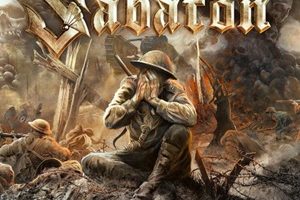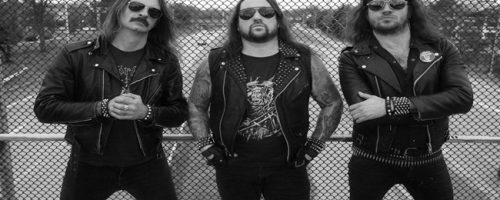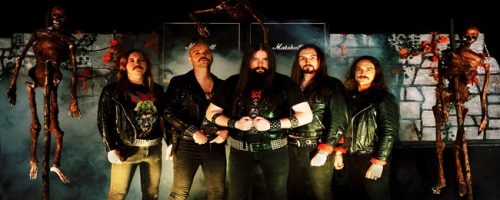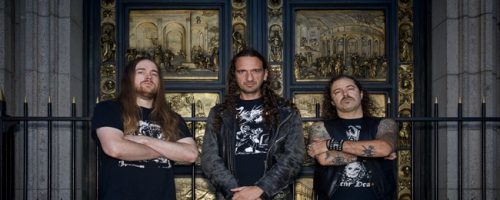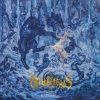Sabaton – Thrill of the Kill
Sunday, 14th July 2019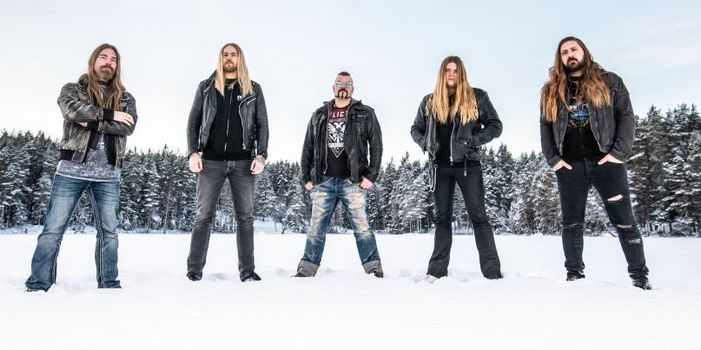
Twenty years strong, Sabaton appear poised to become one of those legacy bands based on their power metal style and complimentary attention to military history from all countries. This time around for their ninth studio album The Great War, the focus of World War I takes center stage for the quintet. Delivering songs that often take on a heavier/darker sheen right out of the gate with “The Future of Warfare”, precision march maneuvers with cyber/electronic accents during “The Attack of the Dead Men” all the way through to a resplendent bombast of orchestration and choir action during “The End of the War to End All Wars” – the record as a whole conveys the strength, challenges, and immeasurable impact this war had on the future of the world.
Ready to bring the readers up to speed with the latest action of Sabaton, singer Joakim Brodén granted us the time to handle a host of topics. You’ll learn about their surprise headlining appearance at Hellfest at the last minute, the brother-like relationship between bassist Pär Sundström and himself, as well as decision making that takes serious account into the fan perspective when going about what’s best for Sabaton as a whole.
Dead Rhetoric: How are things going with the start of summer metal festival season for Sabaton across Europe- including a surprise headlining set feature at Hellfest in France as you stepped in when Manowar pulled out, where Chris and Tommy had to do vocals as you had troubles with your voice?
Joakim Brodén: Yes, that was a surprise for us as well! (laughs) We didn’t know we were playing when we woke up that morning. For us, it was make it happen. I had a little bit of trouble singing the day before, but I thought it would be fine because normally I don’t lose my voice, totally. I get a little hoarse, but I’m up to singing pretty rough anyway. I figured it would be fine. I started losing my voice just minutes before the concert, so what can we do? We can’t cancel on such short notice, so I went out and hoped for the best – I lasted three songs, by the end of the third I had nothing left. Thankfully enough we had our guitar players Chris (Rörland) and Tommy (Johansson) who were able to fill in for me- which is a luxury situation to be in.
Dead Rhetoric: It seems like at these festival shows you are premiering a lot of new stage props and scenery which accent the visual themes of the Sabaton set…
Brodén: Yes, we decided to start anew in a bit of a way. We’ve added stuff to our stage show over the years in the past. We thought this time that every now and then you don’t need to add more stuff, you need to put away some of the old stuff and put something new there. This is the perfect time, our new album is about the Great War, and we can build a World War I inspired stage set, a fictional World War I battlefield of course – but get lots of elements there. It’s a perfect time for us to put in some old Sabaton favorites that we haven’t played that much lately that are about the first World War as well.
Dead Rhetoric: The Great War is the latest album, tackling World War I. It feels like this record had to take on a bit heavier/darker tone at times due to the subject matter – did you realize this as you were working out the musical and lyrical content matching or did this evolve as the writing and recording took shape?
Brodén: I think it started already when the songwriting started. Almost all the songs were written with World War I in mind while doing this. Some songs were written with a theme in mind, other songs were written with the exact specifics in mind even though I didn’t really have the lyrics. For example, the second to last track “The End of the War to End All Wars” was written already at the time of composition like somebody who fought during World War I or lived through World War I standing there as if the last shot had been fired on the 11th of November, thinking back over the past four years. In that case, the atmosphere of the conflict really gets intertwined with the music.
Dead Rhetoric: When it comes to the organ swing part in “The Red Baron” – did that come first, or was that an idea that developed as you fleshed out the music?
Brodén: No, that was the idea! (laughs) I just love that stuff. I started out as a Hammond organ player, that’s how I got into music myself. I just thought, we have these fast song bursts like in “Ghost Division” where the kick drum and snare drum go together, we thought we should be able to do that in a shuffle, you know? And of course, when it becomes fast shuffle, I’m thinking Jon Lord and those gentlemen. I added that because I love it. I don’t know what to call it, a punk rock, swing/shuffle with elements of Hammond organ, it was fun.
Dead Rhetoric: It seems like you set up the album to be a little different, with the choir and bombast tracks towards the second half of the record, was that also done on purpose?
Brodén: Not when writing the songs, but when we come to creating the track list. When we focus on writing the music, the focus is on writing only the best songs possible. Towards the end of the songwriting process you can look at the songs that you are really happy with, and look at them to see what’s missing. Maybe you don’t have something fast, you try to create something fast with the last tracks you are writing. In general, for the way the album is structured that is a bit after the fact. When all the songs are written, it’s important to somehow think about creating a cool listening experience. You want a few surprises, but you don’t want them in the same places all the time. You want support songs, but you don’t want all the hard stuff at the same time.
Dead Rhetoric: What do you believe you learned more about World War I or gained insight/perspective on that you didn’t have before doing your research on the war?
Brodén: Actually I talked to Indy (Neidell) the host of the Sabaton History Channel about that. We talked about World War I, and he was doing a YouTube channel where they followed World War I 100 years after it happened. I asked him because it was such a depressing place to be to do all the research, find the stories and everything. Then he said, think of it this way then- during these four years, and the aftermath, there has been no other time in human history where we’ve done greater advances in the medical field than then.
Dead Rhetoric: You launched a Sabaton History channel on YouTube at the beginning of the year. Had this been an idea always on the backburner, and discuss the work/research it takes to execute these videos – as you want to be as accurate as possible?
Brodén: Yes, the idea has been with us for a long time. Pär and I talked about this fifteen years ago. Wouldn’t it be cool to do a documentary about every song? Because we were passionate about history- and we are not experts by any means. We want to share that passion, as with anything in life if you feel happy, you want to share your passion. It’s a natural thing. Of course in those days, YouTube was something for cute cat videos, it wasn’t for long-form (videos) as it is today. We couldn’t do proper tv documentaries, we would be doing a metal album every ten years if we tried to do a proper tv documentary, it would be too long-winded.
In this format, it’s absolutely perfect. There’s an introduction with myself and Pär, towards the end we can talk about how we came across the stories, have we met people from these stories. It’s a big process, there are about ten people involved in every episode. Everything from editing to research and such things. Thank god the research is not done by us- as I said we are passionate about not the experts. It’s Indy, Spartacus (Olsson) and a third guy who does the research. The historical part… Indy himself is a musician, and they look at our lyrics, see how they are written, and make sure any reference that has been used in the lyrics will be explained, which is really nice. Especially when we read the comments from fans that are like ‘now the second line in the second verse makes so much sense.’ No matter how much we’ve done, we have nothing on these guys – I learn from every episode myself.
I don’t see the historical part until it’s basically edited and almost done. They do that part and then come back to us for a final edit. Every time, I still haven’t had a single change from my part on the historical facts. I’m sitting there like a teenager waiting for my favorite television show, I get to watch it early, you know? (laughs)
Dead Rhetoric: Speaking of right words, does it become challenging to fit the right words in certain songs because of the right pronunciation and melodies to surround the songs?
Brodén: I’m fighting with that every day. Especially how do you say it… you want to use as powerful a vocabulary as possible to get people’s attention. Especially when we are talking about war, death, and destruction as we are, you want to use words that get people’s attention. I want to use … if we are singing about Nazi Germany, I want to use the world ‘reich’ – that’s second to pronunciation which I struggle with every day. I’ve been studying English in school obviously and I’ve been touring around the world but it’s not my native language by any means, so there’s going to be mistakes there as well. Also, we have used German words, I got the grammar wrong once, Latin, I got the gender wrong (laughs). It’s hard, but in the end, we try our best – if I make a mistake with the pronunciation, I can live with it. I did my best, maybe I was a little bit stressed at the time and I made a mistake – as long as we don’t make a mistake to get the facts wrong.
Dead Rhetoric: How would you describe the friendship and relationship between Pär and yourself as the longest running members of Sabaton from the beginning to today?
Brodén: In a way, it sounds like a cliché, but we are like brothers. It’s not like we have to talk to each other every day when we are not on the road. It’s not like we have to agree with everything. That’s fine, I really like that. Over the years we’ve developed this trust. We’ve all made mistakes, and things have turned to shit even though the intentions were good. Over the years I have proven to him and he has proven to me that every time it went wrong, it was something that it was well intended- every decision was made with the best for Sabaton in mind. We’ve proven always that we put the band first in that case, and I know this and Pär as well have put our personal health and safety at risk because we needed to do it. If you keep proving that to each other for twenty years, all of a sudden that you don’t agree with each other on what setlist are we playing each night doesn’t become a big thing.
Dead Rhetoric: How do you feel Tommy has now adjusted to his role within Sabaton? Does his experience in other bands with all his recording helped him step forward in a bigger way?
Brodén: Absolutely. That goes for anyone and any musician joining a band. I found with Tommy he’s the most well-rounded musician in the band. He plays keyboards better than I do- he’s probably the best singer in the band as well. He’s a great guitar player, he thinks he can play drums, but nah- not really! (laughs) It’s a good gang to be in. It was a bit hard for him in the beginning because we have a bit of very rough, internal humor. Tongue in cheek, and we are always giving each other a hard time, but always with love of course. For the first couple of months he had a hard time adapting to our very hard ways towards each other. We talked about it, and it sorted itself out just fine.
Dead Rhetoric: Discuss the importance of branding and merchandising to keeping Sabaton top of mind for your fans/followers?
Brodén: That’s a question you should ask Pär. He’d probably give you a twenty-minute speech on its importance and how to utilize it to the max. Over the years we’ve developed this relationship where when it comes to the business side of things, he’s running the show and I’m the sidekick. When it comes to the musical side of things, I’m running the show and he’s the sidekick. If you ever have the chance to interview Pär, he’s the man for that answer. I can give you a light version though.
From a personal perspective we just feel that it is really important, but you should never put the merchandise first. Everything we do, no matter if it’s music, merchandise, or a festival, or a cruise- it should be born out of the love of something. Would I wear that t-shirt myself? Would I go to that festival myself? Would I want to listen to this song myself? It should be proud to wear it, visit it. If you care, whether it’s making music, or cell phones, or video games – if you really care about something and you actually make something good, you can love something and it’s shit. However, you can only, at least for me, create something truly great when it’s born out of love, and not monetary interest. I don’t mind the money- trust me, I’m not stupid. However I don’t think that money should be the first thing on your mind- it’s a consequence. If you make sure you make the best goddamn song in the whole world, the best cell phone, or the best car in history- unless you get unlucky and somebody rips you off or steals your patent, you are going to make money, it’s a consequence of doing something great. So why bother about the money when you are creating something?
Dead Rhetoric: Is that why when it comes to creating songs, do you ever think about developing epic tracks versus a lot of the shorter constructs you prefer for Sabaton?
Brodén: That’s the thing, everybody likes different parts of Sabaton, and as we are growing, everybody has their favorite era. And we didn’t come – boom, here we go. And we had a break all over the world. In Northwestern Europe people discovered us 16 years ago. In North America, most people discovered us post-2012, and most people 2014 or later. We’ve been going, and it’s a very normal thing that people always hold the album or the albums that sound similar to the point when they discovered the band highest.
If you discovered Metallica on Kill ‘Em All or Ride the Lightning, you are not going to like Load or Re-Load. However I know people who discovered the band at Load or Re-Load, and they love those (albums). Over the years it’s tricky for us as well. Luckily most people don’t like our first album Metalizer – there are a few okay tracks there of course, we can live with that because it was the best we could do at that time. Doing a long song or a short song, I don’t think about it that way – to me it’s about what does this story need, what does this song need. We have a few seven-minute songs, but we usually end up (with songs) between three and a half to five-minutes I guess.
That’s the format I like, because it takes a lot from the listener and also the composer, to do something interesting for twelve or fifteen minutes. It’s very rare- I’m not sure I could do it. Listening to other bands, Arjen with Ayreon can do this, and maybe Helloween did it with “Halloween” or “Keeper of the Seven Keys”, but I can’t say I’m a big fan of really drawn out, long songs.
Dead Rhetoric: What type of goals does a veteran band like Sabaton set for themselves now, after achieving a certain level of success and sustainability in the global metal scene?
Brodén: Bigger, better. I’ve never been a fan of a set goal- we are going to have to headline a festival one day. Yeah- guess what? You headlined that festival, okay- what’s next? A repeatable goal – if we do a great show on a tour or a festival, whichever. If we do a really good show, best in our career, best lights, best crowd, best sound, best stage show, musicianship – everything. It rarely all clicks. You can get two or three of those, but everybody has a different experience. We’ve had cases where half the band come off stage saying, ‘yeah- tonight was awesome!’ and then somebody is like ‘oh no- I made some mistakes’.
When it’s your best metal show ever – if your goal is to make the best metal show ever, you just raised the bar. It can become even better- and that’s my goal at least.
Dead Rhetoric: Can you look back to a certain event or circumstance in your life (or career of Sabaton) that may have been an initial setback or failure- but in the end set you up for a future win or success that you learned from?
Brodén: Yeah. Signing with our first official record deal, they wanted to release our demo and then our album. They released the demo, and the album never came. We got angry, and that made us record the album Primo Victoria, all on our own. And we rehearsed and played shows, and that setback increased our determination to prove what we can do so much that it fueled the fire and probably created what is known as Sabaton today. Both from a musically standpoint and nobody else was going to do things for us so we decided to take matters into our own hands. That album Metalizer was released in 2007 so it was released as our third album, but it was actually our first.
Dead Rhetoric: How do you see the next year or two shaping up for Sabaton? Any surprises to celebrate anniversaries and such of the band?
Brodén: We did “Bismarck” – we released the single and did the video for the song, and that was sort of our thank you to our fans for twenty years of service. We asked ourselves what we should do, we had a lot of ideas, but we asked ourselves, what would we want from our favorite band? Well, music – let’s make a kick ass song and give it away for free. And what should be the topic, and we love dealing with military history, so we took the most requested one which was the Bismarck. To be honest, it’s the second most requested one, the most requested one is Star Wars and we are not going to do that. We went on with this, we made a video and a song and gave it for everyone to not monetize it. People however got angry with us because they could not listen to this on Spotify or whichever thing they have- they asked where they could buy this? That was not the point!
Lots happening, we haven’t announced everything yet. There are more things in the works. First thing is North America, Russia has been announced as well. The next thing up is October/November in North America.













